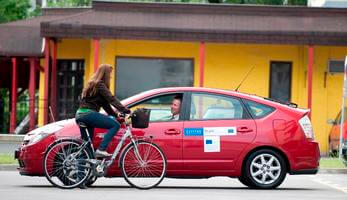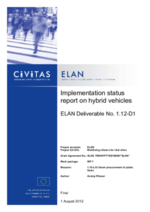Green procurement for cleaner public fleets
Summary
The City of Ljubljana has deployed new hybrid vehicles to the city fleet to create a clean and energy-efficient image for the city, and to promote hybrid vehicles as private cars. At the start of the project, there were no hybrid vehicles in the public vehicle fleet. Ljubljana has included the reduced fuel consumption and energy efficiency as award criteria in public procurement.
Implementing sustainable mobility
The main objectives were:
• To implement the green procurement principle in practice by renting hybrid personal vehicles for the city’s fleets;
• To lower fuel consumption;
• To improve air quality by lowering emissions;
• To promote the use of hybrid vehicles in the public and private sector by giving good examples and raise their acceptance;
• To help extend a market for hybrid vehicles;
• To improve the acceptance of hybrid vehicles and check the impact on public procurement activities.
Progress
In 2009 Ljubljana has changed the entire city fleet completely. Old cars were changed for new vehicles, among them six hybrid cars were rented, which represents roughly 10 percent of the city's entire car fleet. Data on fuel consumption and costs have been collected and analysed; they show good results in fuel consumption, emissions of CO₂ and noise, but rather poor in the category of costs, as the leasing costs of hybrids are (due to the high price of hybrids compared to normal cars) too high. Furthermore, 50 company bicycles have been purchased and are in use by the city administration and city traffic wardens, substituting for business trips by cars. In the framework of the measure also an eco-driving training for employees of the city administration has been carried out.
Outcomes
The data on fuel consumption and costs of six hybrids has shown interesting results concerning their economic and environmental impact compared with ordinary cars: a reduction in fuel consumption, CO₂ emissions and noise from the public vehicle fleet. However, because of high costs of hybrids compared to normal cars their positive effect of lowering the environmental impact did not outweigh their costs. During the project, new development has brought Euro6 generation of car engines to the market. By using two of vehicles of this new generation for the eco driving course, it was practically shown that by very skillful driving, new generation of cars with Euro6 engines can compete with hybrids considering their fuel consumption and are considerably cheaper, too. Another interesting finding has been brought by the eco-driving course, which had been accepted with much emphasis and interest. It has been proven that the biggest reserve for lowering the fuel consumption is related to the drivers and their driving habits. With skillful driving fuel consumption can be lowered by a quarter or almost by on halve in extremes. The use of company bicycles has furthermore lowered costs for business trips in the city and contributed to sustainable mobility.








